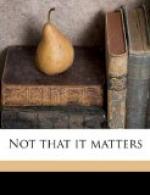But there arises now the objection that a man may conceal his mouth, and by that his character, with a moustache. There arises, too, the objection that a person whom you thought was a fool, because he always went about with his mouth open, may only have had a bad cold in the head. In fact the difficulties of telling anyone’s character by his face seem more insuperable every moment. How, then, are we to tell whether we may safely trust a man with our daughter, or our favourite golf club, or whatever we hold most dear?
Fortunately a benefactor has stepped in at the right moment with an article on the cigar-manner. Our gentleman has made the discovery that you can tell a man’s nature by the way he handles his cigar, and he gives a dozen illustrations to explain his theory. True, this leaves out of account the men who don’t smoke cigars; although, of course, you might sum them all up, with a certain amount of justification, as foolish. But you do get, I am assured, a very important index to the characters of smokers— which is as much as to say of the people who really count.
I am not going to reveal all the clues to you now; partly because I might be infringing the copyright of another, partly because I have forgotten them. But the idea roughly is that if a man holds his cigar between his finger and thumb, he is courageous and kind to animals (or whatever it may be), and if he holds it between his first and second fingers he is impulsive but yet considerate to old ladies, and if he holds it upside down he is (besides being an ass) jealous and self-assertive, and if he sticks a knife into the stump so as to smoke it to the very end he is— yes, you have guessed this one—he is mean. You see what a useful thing a cigar may be.
I think now I am sorry that this theory has been given to the world. Yes; I blame myself for giving it further publicity. In the old days when we bought—or better, had presented to us—a cigar, a doubt as to whether it was a good one was all that troubled us. We bit one end and lit the other, and, the doubt having been solved, proceeded tranquilly to enjoy ourselves. But all this will be changed now. We shall be horribly self-conscious. When we take our cigars from our mouths we shall feel our neighbours’ eyes rooted upon our hands, the while we try to remember which of all the possible manipulations is the one which represents virtue at its highest power. Speaking for myself, I hold my cigar in a dozen different ways during an evening (though never, of course, on the end of a knife), and I tremble to think of the diabolically composite nature which the modern Wellingtons of the table must attribute to me. In future I see that I must concentrate on one method. If only I could remember the one which shows me at my best!
But the tobacco test is not the only one. We may be told by the way we close our hands; the tilt of a walking-stick may unmask us. It is useless to model ourselves now on the strong, silent man of the novel whose face is a shutter to hide his emotions. This is a pity; yes, I am convinced now that it is a pity. If my secret fault is cheque-forging I do not want it to be revealed to the world by the angle of my hat; still less do I wish to discover it in a friend whom I like or whom I can beat at billiards.




